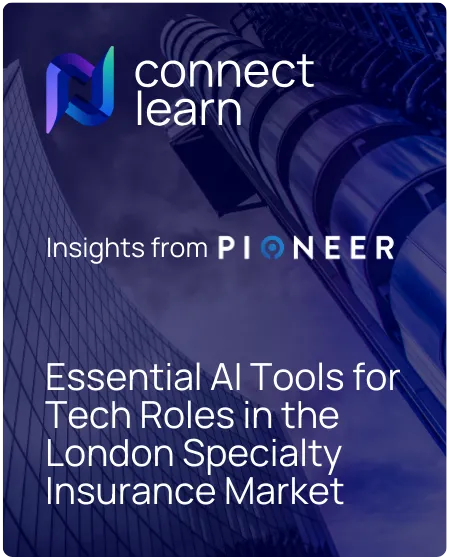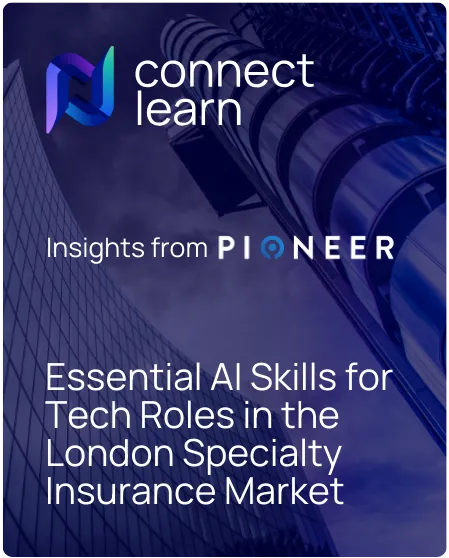Sarah Hanna, our go-to data recruitment and talent expert within the London Markets scene at Pioneer Search, has been diving deep into conversations with her extensive network of clients, candidates, and industry leaders.
The consensus? AI will remain the driving force of innovation. From the thrilling opportunities it presents to the complexities it brings, one question keeps popping up: What’s next for Data & AI?
Check out the five top talking points below:
Generative AI & Agentic AI
Generative AI has matured into a transformative technology, driving innovation across a variety of sectors, including financial services and insurance. Its ability to create hyper-realistic content, simulate scenarios, and personalise user experiences is reshaping how businesses engage with customers. Whether it's generating content or streamlining R&D processes, Generative AI has fast become a business-critical tool.
Agentic AI, on the other hand, represents the next wave of advancement. Unlike traditional AI, which requires human intervention to act on insights, Agentic AI systems are designed to operate autonomously. These systems can analyse data, make decisions, and take actions independently, making them invaluable for insurance applications.
In 2025, the race is on for businesses to integrate these AI advancements effectively. Success will depend not only on adopting the technology but also on building ethical frameworks, ensuring accountability, and aligning AI outputs with strategic objectives. Those who adapt quickly will redefine their respective industries.
----
Synthetic Data
As privacy regulations such as GDPR and CCPA tighten, synthetic data has emerged as a critical innovation. Unlike anonymised data, which can often be reverse-engineered to reveal sensitive information, synthetic data is entirely artificial.
Generated using sophisticated algorithms, it mirrors the statistical properties of real-world data without exposing individual details, making it ideal for privacy-conscious applications.
Synthetic data has a growing list of applications in insurance where it can help insurers model claims scenarios and assess risks without relying on sensitive policyholder information, enabling more accurate underwriting and product development.
In 2025, synthetic data is expected to become a core enabler of AI innovation, reducing compliance barriers and accelerating experimentation while respecting privacy mandates.
Real-Time Data
Real-time data capabilities are becoming a cornerstone of competitive strategy. In insurance, having up-to-the-second insights can mean the difference between success and failure as real-time risk modelling allows companies to adjust premiums dynamically based on live data, such as weather conditions or traffic patterns.
For the London Market specifically, where risks and regulatory requirements evolve rapidly, real-time data ensures businesses remain compliant, competitive, and agile. By 2025, the expectation for real-time decision-making will be non-negotiable, requiring businesses to invest in infrastructure that supports instantaneous data processing and actionable insights.
Data Trust
The reliability of AI and analytics hinges on the quality of the underlying data. Inconsistent, inaccurate, or incomplete data can lead to poor predictions, faulty insights, and ultimately, misguided decisions. This makes data trust one of the most critical challenges of 2025.
Building trust in data requires:
- Data Governance: Implementing rigorous processes to oversee data collection, storage, and usage.
- Validation Tools: Leveraging advanced AI tools that can detect anomalies and flag potential errors in data sets.
- Transparency: Providing clear visibility into how data is sourced and processed, ensuring stakeholders can rely on its integrity.
In addition to improving analytics outcomes, trusted data strengthens customer confidence and regulatory compliance. By prioritising data trust in 2025, businesses can establish themselves as dependable and ethical players in their respective markets.
Data Democratisation
Gone are the days when data insights were confined to IT or specialised analytics teams. In 2025, data democratisation is reshaping workplace dynamics by making data accessible to everyone across an organisation.
This trend is powered by:
- User-Friendly Tools: No-code and low-code platforms are enabling employees, regardless of technical expertise, to interact with data and extract insights.
- Training Programs: Companies are investing in data literacy initiatives to empower employees with the skills to understand and use data effectively.
- Collaborative Platforms: Cloud-based solutions are breaking down silos, ensuring data flows freely across departments.
The impact of this shift is profound. Decision-making becomes faster and more informed, innovation accelerates, and employees at all levels feel more engaged and empowered. By fostering a culture where data is seen as a shared resource rather than a guarded asset, businesses can unlock new levels of creativity and efficiency in 2025.
------------
The interplay of these trends—Generative AI, Synthetic Data, Real-Time Data, Data Trust, and Data Democratisation—will shape the AI-driven future of 2025. By understanding and leveraging these developments, London Market and Specialty Insurance businesses can thrive in an increasingly complex and competitive landscape.
What do you think? Connect with and follow Sarah on LinkedIn today, and feel free to drop her a message to share your thoughts or explore how these trends might shape your organisation’s data and AI strategy in 2025.
📞 0203 828 6959
📧 sarah@pioneer-search.com














